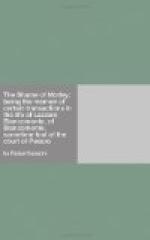At Biancomonte I was likely to spend my days as little better than a peasant, but surely a peasant’s estate with such a companion as was to be mine was preferable to an emperor’s throne without her.
The bleak landscape seemed to me invested with a beauty that at no other time I should have noticed. God was good. I swore a thousand times, the world was a good world—so good that Heaven could scarce be better.
I had come, perhaps, the better half of the distance I had to travel, and I was giving full rein to my joyous fancy, when suddenly I espied ahead a company of horsemen. They were approaching me at a brisk pace, but I took no thought of them, accounting myself secure from any molestation. If it so happened that it was a search party from Pesaro, seeking two men disguised as monks who had ravished the coffin of Madonna Paola di Santafior, what should they want of Lazzaro Biancomonte? And so, in my confidence, I advanced even as they trotted quickly towards me.
Not until they were within a matter of a hundred paces did I raise my eyes to take their measure; and then I halted on my step, smitten of a sudden by an unreasoning and unreasonable fear, to see at their head the bulky form of the Governor of Cesena. He saw me, too, and, what was worse, he recognised me on the instant, for he clapped spurs to his horse and came at me as if he would ride me down. Within three paces of me he drew up his steed. Whether the memory of the other two occasions on which I had thwarted him arose now in his mind and made him wonder had not some fatality brought me across his path again to send awry his pretty schemes concerning Madonna Paula, I cannot say for certain; yet some suspicion of it occurred to me and filled me with apprehension.
“Body of Bacchus!” he roared. “Is it truly you, Boccadoro?”
“They call me Biancomonte now, Magnificent,” I answered him. But my tone was respectful, for it could profit me nothing to incense him.
“A fig for what they call you,” he snapped contemptuously. “Whence are you?”
“From Pesaro,” I answered truthfully.
“From Pesaro? But you are travelling towards it.”
“True. I was making for Cattolica, but I missed my way in seeking to shorten it. I am now returning by the high-road.”
The explanation satisfied him on that point, and being satisfied, he asked me when I had left Pesaro. A moment I hesitated.
“Late last night,” said I at last. He looked, at me, my foolish hesitation having perhaps unslipped a suspicion that was straining at its leash.
“In that case,” said he, “you can scarcely have heard the strange story that is being told there?”
I looked at him, as if puzzled, for a second. “If you mean the story of Madonna Paoia’s end, I heard it yesterday.”
“Why, what story was that?” quoth he in some surprise, his beetling brows coming together in one broad line of fur.




